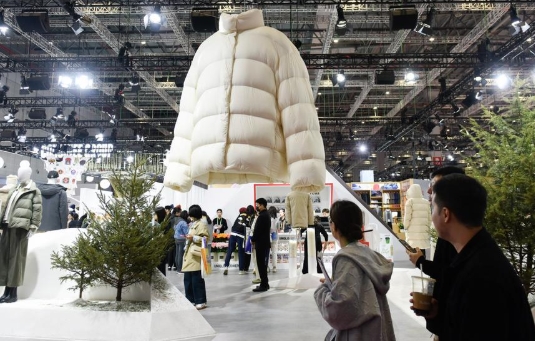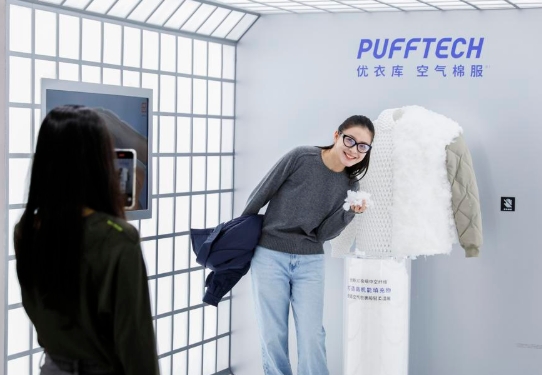CIIE boosts Uniqlo's confidence in Chinese market, says Greater China CEO

People pass by the booth of Uniqlo at the Consumer Goods Exhibition Area during the seventh China International Import Expo (CIIE) in east China's Shanghai, Nov. 7, 2024. (Xinhua/Xu Liang)
Highlighted by a huge white down jacket hanging in mid-air, Uniqlo, a world-renowned Japanese clothing retail giant, showcased its latest products in a 1,000-square-meter booth at the seventh China International Import Expo (CIIE).
This was the fifth time the casual wear company took part in the annual event in east China's Shanghai, while the 40-year-old brand also signed up for next year's edition of the CIIE.
The 2024 installment of the six-day expo, which closed on Nov. 10, attracted some 3,500 global exhibitors from 129 countries and regions. It saw a total of 80.01 billion U.S. dollars' worth of tentative deals reached for one-year purchases of goods and services, an increase of 2 percent compared with the previous year.
"We can feel the appeal of the CIIE for global customers each year," said Pan Ning, CEO of Uniqlo Greater China, adding that participation at the event had strengthened the company's confidence in the future of the Chinese market.
Pan's belief does not come from nowhere, as China is the largest overseas market for the Japanese company. Figures show that as of Oct. 31, the Chinese mainland boasted 927 Uniqlo stores, more than a third of its total of over 2,500 stores worldwide. Among these, nearly 20 new stores opened in September and October this year -- including its first store in Sanya, a tourist city in China's southernmost island province of Hainan.
In the 2024 fiscal year, Uniqlo's sales revenue in Greater China reached a whopping 677 billion yen (about 4.38 billion U.S. dollars), up 9.2 percent year on year, according to Fast Retailing, Uniqlo's parent company.
Starting in the 1990s, the clothing retailer has managed to develop its own supply chains in China to ensure the quality of its products. In 2002, it decided to open stores in China, a move buoyed by China's entry into the World Trade Organization the previous year.
Facing steep competition, the company first placed emphasis on identifying ways to reduce costs and gain a price edge in the large-scale consumer market -- with their initial efforts failing, as evidenced by dismal sales.
"Consumers are really smart. If you keep offering them low-quality products, they will leave you," Pan said.
Drawing on the lessons from its poor early performance, the company embarked on a new journey in the Chinese market in 2006, offering the latest high-quality products and services just as in Japan, aiming to provide Chinese consumers with "a refreshing experience," according to Pan.

A visitor poses for photos at the Uniqlo booth of the Consumer Goods Exhibition Area during the seventh China International Import Expo (CIIE) in east China's Shanghai, Nov. 6, 2024. (Photo by Chang Nengjia/Xinhua)
Uniqlo also attempted to introduce localized measures to attract buyers. Ahead of the 2008 Beijing Olympic Games, it launched a batch of "Uniqlo T-shirts" (UT) featuring patterns of global cultural elements, as the Chinese people embraced worldwide visitors and sought cultural exchanges.
This marked the beginning of UT's popularity in China. Currently, China still tops the sales of this range around the world, said Pan.
At its flagship store in Sanlitun, a popular shopping area in Beijing, one can easily find layers of T-shirts featuring local cultural symbols, such as Beijing Opera facial masks and the Temple of Heaven, in addition to thermal underwear and coats made of new materials.
During the just-concluded CIIE, Uniqlo presented its latest line of UT in collaboration with the Shanghai Museum, enabling consumers to bond with ancient bronze collections through their daily choice of attire.
"In China, Uniqlo's business has been growing up with the Chinese market over these years. We are the beneficiary of China's economic growth and market development," said Pan.
With one of the largest booths at the 2024 CIIE, Uniqlo intended to present itself as a representative of win-win cooperation between China and international companies. "We want to let the world know that foreign brands can make a difference in the Chinese market," said Pan.
Editor:伏娅敏
